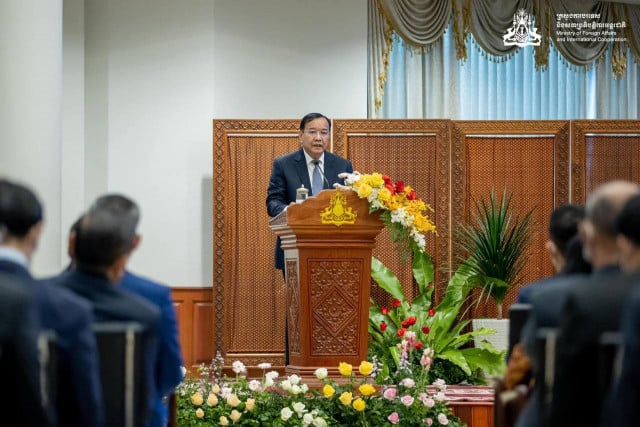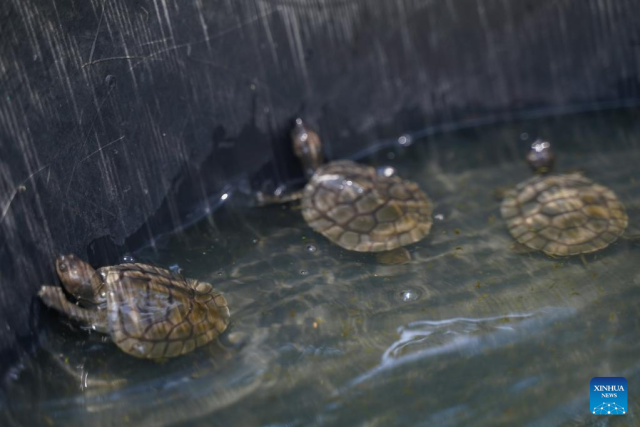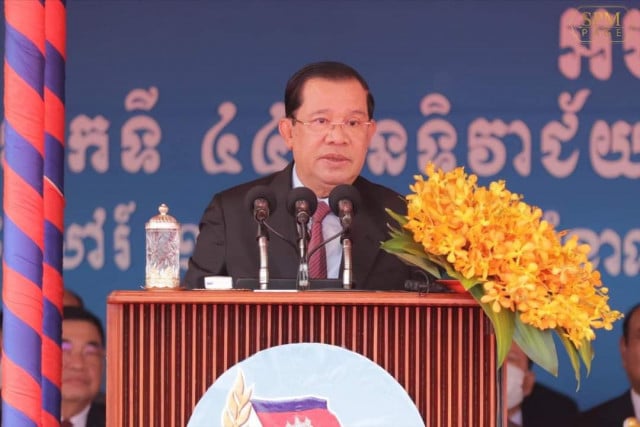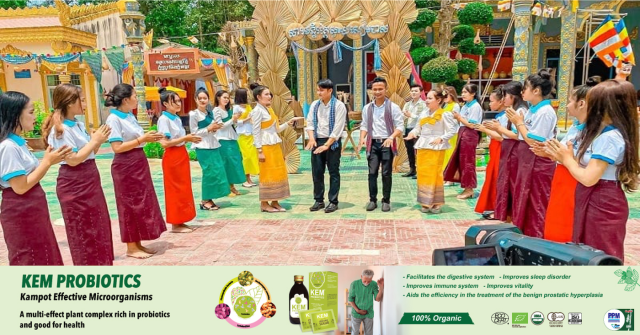“A Good Diplomat Is the One Who Can Turn the Enemy into a Friend”
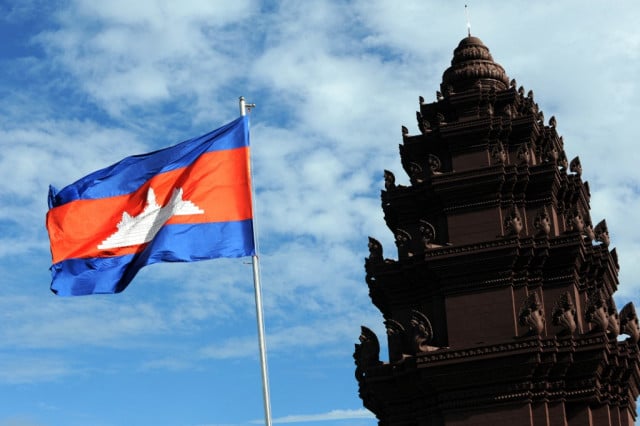
- Ky Chamna
- May 9, 2021 4:38 AM
Being a diplomat is not that different from other careers. However, the work does require some unique ability for adaption and creativity in order to function at best in this role. And the work of a diplomat is, of course, quite challenging. Overcoming the inevitable obstacles is also one of the main tasks diplomats have to undertake. Different environments, different people from diverse backgrounds, the defense of a country’s interests as well as different food and climate are some of the things diplomats have to contend with. Ky Chamna, journalist at Cambodianess, has interviewed Pach Chhoun, a former Cambodian diplomat who served in this career for several decades, to find out more about diplomacy.
Ky Chamna: You have worked in various capacities both in and beyond ASEAN. First, what have been for you some of the most memorable moments of your diplomatic career? And how have those memorable moments helped shape your perception of diplomacy?
Pach Chhoun: Well, I started my career as a diplomat in 1985 in spite of the fact that I had joined the service in October 1979. As a junior diplomat at that time, I started my travels abroad as a member of our delegation, looking after all the needs of the entire delegation, from translation to administrative requirements and facilitation, especially when you travel with a high-ranking delegation.
Later, I experienced my first posting as a middle-ranking diplomat abroad. Our embassy was small with a few diplomats working around the clock on all required tasks, from maintaining relations with the host country, collecting and analyzing information, to regular feedback to our headquarters, making friends and trying to promote and protect our national interest. The tasks would be heavier when there was a high-ranking official’s bilateral visit to the host country. With only the ambassador and two other junior diplomats with you, you had to look after all the areas of [international] relations such as politics, security, economics, trade, investments, education, culture and even military cooperation. Line of communication to and from the HQ (headquarter) was also strained as there were no hand phone or internet like nowadays. We had to rely on telegram (wired telegram), telex or corded phones through operators. So, for some of the urgent work such as helping our nationals in need or in distress, we had to decide what to do based on rules and procedures as well as the local and international norms.
Besides, during the 1980s and early 1990s, our country was poor. It was in a raging civil war with economic sanctions from the West and the rest of the free world. Our salaries were small, thus we could not afford to support dependents abroad. Most diplomats lived alone as their families had stayed back in the country and they had to save their income to send to their families. Now, you see, we were under stress both due to the workload as well as in personal life. With our policy reform from 2016 on and with the steady growth of our economy, our current diplomats are far better than us when we compare to the 1980s and the first half of the 1990s.
One thing that every Cambodian diplomat bears in mind is that, whatever he or she does, the public and the host country will consider that it is the act of Cambodia and not the personal act of an individual diplomat. Then, when you work, play or travel, you have to be conscious of this.
One more thing that helps us in our diplomatic career is the experiences and knowledge that we acquire along the way during our careers. For example, I have learnt how to manage groups of people, people of different nationalities, different religions and different cultures. I gained experience in negotiation skills, which sometimes knowledge alone cannot address. These continued-learning process and experiences shaped my diplomatic career.
Ky Chamna: When performing your duties abroad, important meetings can be broadcast via media platform. However, besides what is shown on the screen, what are some of the main daily activities of a diplomat?
Pach Chhoun: Well, nowadays the media, both electronic and printed media, always project good or bad activities to the public. They have the power to mobilize public opinion on the state’s or individual’s activities. They, most of the time, manipulate facts for the benefit of their sponsors. Thus, as a diplomat, you have to be very careful with the media. They can promote you and they can also harm you and the state for their sponsors’ benefits.
During my time and even now, whatever we do, whether it is a meeting, a conference, a bilateral call or a state visit, diplomats need to speak to the media in order to avoid misinformation. However, there are limits to how much you can let the media know. That is why whenever there is a meeting, a conference or a state visit, there is always a press briefing or press release from the embassy concerned and from the HQs [ministries of foreign affairs] of both the host country and the visiting dignitary’s state. Whenever you brief the media, it has to be coordinated so that you tell the same story as HQ.
As for our daily activities, we do not need to inform the media. We regularly report every activity to our HQ and vice versa. We receive instructions and recommendations on certain important activities to maintain friendly relations with the host [country] as well as with the rest of the diplomatic community in the host country. We also bear in mind our primary tasks of promoting and protecting our national interests in every field. We perform multi-tasking jobs due to the lack of diplomatic staff as well as our small budget. Myself and…my colleagues were and are doing well in our jobs despite the workload and the stress we face.
Ky Chamna: When taking into account the relationship between family, friends as well as colleagues here in the home country, how challenging, on the daily basis, is working overseas as a diplomat over an extended period of time?
Pach Chhoun: I think I have answered this question earlier. During my time, Cambodia was in a civil war. The country was under heavy economic sanctions by the so-called “Free World.” Thus, the country was very poor. Our external relations budget was small and our salaries were very low back then. We, diplomats, at that time could not afford to bring our families along for our 3-year mission abroad and we could not afford air travel back and forth to visit our families. Most of us could only visit home one time in three years. Besides, there was no internet and no mobile phone at that time. We relied on wired messages and telex or otherwise corded phones via operators, which was very costly. We sent letters through the diplomatic pouch, which came once a month, or through delegations that visited or transited at our place. So you can see that our relationships with family and friends at home were very strained. Nowadays, people have social media such as Facebook, Messenger, Viber, Skype, etc., to keep in contact with friends and families. Besides, with our current Minister of Foreign Affairs [Prak Sokhonn] who introduced reforms in foreign policy from 2016 on and with the stable growth of our economy, the state can afford to provide with appropriate support and salaries our diplomats both inside and outside [the country]. Thus, they can afford to bring their family members along on their missions abroad. It helps them relieve some personal stress, which allows them to focus mainly on their workload.
Ky Chamna: As you have studied and worked for many years outside Cambodia, what are some of the tricks or tips for maintaining your body healthy and your brain sharp at all times, especially when there are important meetings that can last for days?
Pach Chhoun: Well, whenever you travel overseas, you should be aware of the cultural diversity. Diplomats should be well aware of these differences. What I meant by saying cultural diversity? It includes different religions, traditions, foods and practices. For example, some people may find it difficult to adapt to hot spicy food, hot climate, a rude society and so on whenever they are outside their countries. That is because they do not understand cultural differences. Some students studying abroad were upset because of the food they had to eat as it is not the favored taste of their food at home. Some even complained about different habits, different practices and even social discrimination. This is not a small thing. It sometime leads the person to…some sort of unbearable behavior resulting in abandoning his or her studies or jobs abroad.
In my experience, we should be well aware of the culture of the place where we are about to go and stay. We should improvise, making use of whatever is available to us in a place. For example, food ingredients are the same, the only difference is the way to prepare the food. Indian food, Indonesian food or even European food are prepared from the same ingredients such as meat, vegetables, spices or salt. Thus, why do we need to ask our parents or relatives to send us food from home while risking the penalties or fine of importing banned products? The problem is learning to cook your own food. However, that can be learned in time. Most of the diplomats in my time, including me, could cook our traditional dishes very well. We were not born with these skills, but we had to learn so that we could do everything by ourselves.
Apart from cooking, diplomats, students or migrant workers have to know the basic skills of driving as well as finding our way around the place where we live. We should continue to learn new things from the society, the people and nature around us. For example, during my time, there was no computer, no internet, no Wi-Fi or social platforms. We relied on typewriters, telex and wired telegrams. But when time changed, we also changed our habits from using typewriters, telex and wired telegrams to computers and other social platforms. How could we do so? That is because we continued to learn new things from the new environment with new ways to improvise.
Ky Chamna: Diplomacy is intricate and sensitive work, which demands a lot of logical understanding, knowledge and background work for diplomats. Some older diplomats in the field might say that “challenge is a fun game.” For you, personally, do you think that “challenge is a fun game?”
Pach Chhoun: I do agree that challenge is a fun game because, as I said earlier, I believe in continued learning. So, challenges compel you to learn more to address the challenges you face. Challenges also compel you to use your wits and not to strictly follow the rules and procedures. You may think of something similar that is not part of the rules and procedures, but suitable to address the challenges you face. If you only stick to the rules, then, sometimes, you get stuck. For example, in cooking your own dishes such as “toek kroeung” or “sgor pha-ok,” and somehow you do not have “prahok” or “pha-ok” as in our traditional recipes. So, how could you cook? You use your wits. There is a type of canned fish called anchovies that you can buy in supermarkets in any country. It tastes very similar to “pha-ok” or “mam.” Besides, you can buy prahok at any Asian grocery nearby. Thus, why the need to ask people from home to risk sending these foods to us?
Also, in politics, challenges compel us to do more research to find solutions to address them. They compel us to learn more, to find our way through, to find appropriateness for the protection and the promotion of our interests. Without challenges, people will take it to account of their content of life, thus abandoning their struggles, their efforts to study new ways and to keep themselves up to date. People should take on a challenge as a fun thing so that they can enjoy doing more research, more discoveries to address the challenge. You know, I play chess. In a game of chess, I find it enjoyable whenever I play with stronger opponents so that I can learn their moves and learn how to solve the deadlock when they checkmate me. I feel bored when playing with weaker opponents and I can easily win a game. It is no fun.
Ky Chamna: As inspiration for today’s generation of people seeking to become diplomats, what are the crucial and unavoidable steps to climb the ladder to become a diplomat? In addition to gaining an adequate amount of theoretical knowledge in international relations, what are some of the important personality traits that future diplomats should have?
Pach Chhoun: You see, when you get any job, what you should do first is to prove your capacity and ability. Forget promotion, because it is the job of your supervisors or your managers, not yours. Why? Because, if you start thinking of promotion first, then you start seeing jealousy and personal pride. You need teamwork spirit, quality of work and experience to be promoted. Of course, there sometimes is social injustice in some places, but be patient and ignore it. Later on, your work will improve and your promotion is already in sight. You know, as a young diplomat, normally he or she is very proud of herself or himself. Thus, this pride may intrude on senior staff, which can create an unpleasant environment in the workplace both inside and outside the country. Try to avoid the expression “a Cambodian is a warrior,”—they usually fight among themselves, not others.
Theoretical knowledge helps your work as a diplomat, but it cannot in itself help you be a good diplomat. Experience and patience make you a good diplomat. That is why one of the criteria for ambassador is age. He or she should be more than 45 years old and have held many positions both inside and outside [the country]. He or she should have held the rank of, at least, director general at the home base. If an ambassador is too young and has less experience in the foreign service, he or she will not be respected as much in the diplomatic circle in the host country.
Ky Chamna: In a diplomatic world, some might view that “there are neither friends nor enemies: There are only interests.” How would you comment on this?
Pach Chhoun: Well, in the field of foreign policy, there is no friend, no enemy, but national interest only. However, as a diplomat, one should use his or her wits to make one’s way through. The motto of our nation is to make more friends and less enemies. So what should we do? Well, one of our main tasks abroad is to collect more reliable data or intelligence from reliable and official sources, analyze and send this home. While doing so, we need to make lots of friends from different circles in the host countries and we have to make contacts and meet everyone there and then. That is why sometimes people say that diplomats always party and toss glasses of wine. Well, we collect information through these glasses of wine and cups of coffee as well, and that is why we do it. Nevertheless, whatever we do, we always bear in mind our duty to protect and promote our national interests.
If you look into the second priority of the Cambodian foreign policy, it says: Conducting foreign policy in a smart, flexible, but firmed way. Meaning that we should be smart or witty and flexible in promoting our national interests. We can bend a little bit and avoid confrontation if possible. However, we have to stay very firm on promoting and protecting our interests. Saying this is very easy, but implementation is a tough thing. You know that your friends are against your own interests as they also have to protect their own interests. So, in negotiating text or agreement, you have the duty to study every word that was proposed by others, including your friends and your “opponents.” When you find any word that may harm your national interest, you oppose it and propose a change. In this sense, you need to find a similar word that can produce no or less harm to your national interests. Sometimes, you need to find words that can provide a win-win situation so that you can persuade your opponents to abandon their original words. In this context, you need support from your friends in the circle and even sometimes friends in the opponent’s circle. A good diplomat is the one who can turn the enemy into a friend. It is a challenge, but it is fun that you can use your skills and wits to win in the negotiation game.
Pach Chhoun is a pseudonym as the interviewee wishes not to be identified






